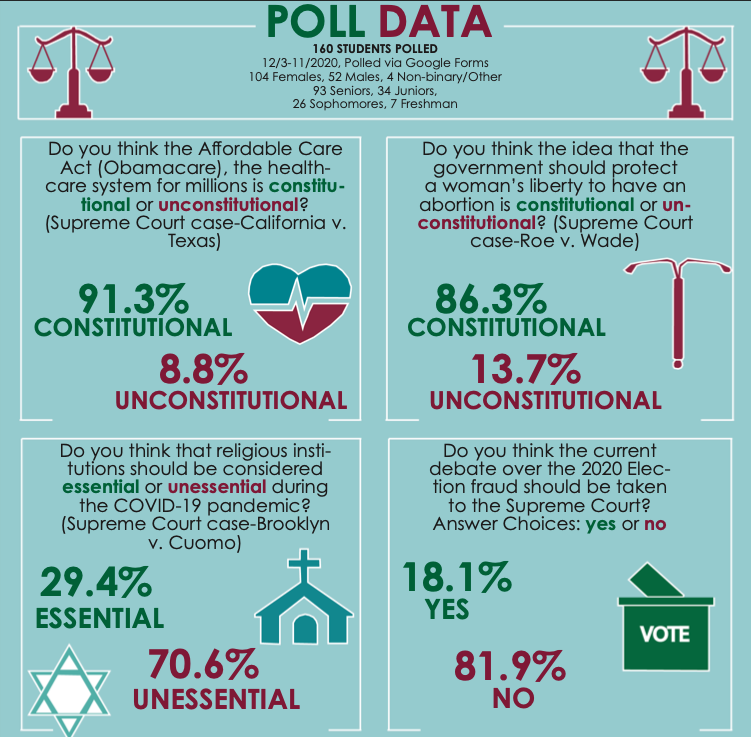Barrett’s confirmation causes dispute
Nation faces even more conflict over issues projected to be considered by the SCOTUS
January 4, 2021
After the death of Supreme Court Justice Ruth Bader Ginsburg, President Donald Trump nominated Amy Coney Barrett to fill her place on the Supreme Court. On Oct. 12, the Supreme Court began a confirmation hearing to consider the nomination.
Just two weeks later, on Oct. 26, the Senate inducted Barrett as the 115th Associate Justice of the United States Supreme Court (SCOTUS).
“A President with three Supreme Court picks is pretty unheard of,” United States History teacher Kaylin Brett said. “Since the past two nominees are also very young, the conservative court is going to last decades.”
Junior Lizzie Jensen believes that the country should have waited to fill Ruth Bader Ginsburg’s place on the court until after the election, which was Ginsburg’s final wish.
“Whether or not you agree with Ruth Bader Ginsburg’s ideas, you have to recognize that she was highly respected and deserved to be honored,” Jensen said. “The confirmation shows how politicized the system has become.”
While Barrett’s nomination to confirmation process only lasted 30 days, concluding one week before the election, it traditionally takes up to 68 days to nominate and confirm a SCOTUS justice, according to NPR.
“I’m very pleased with the confirmation of Justice Barrett and I believe that in the future she will prove an asset to the traditionalist right, but not cause any upheaval over current issues,” sophomore James Dick said.
After the confirmation of Justice Barrett, the SCOTUS has a six to three conservative majority. Brett believes that this majority will impact issues that are going through the SCOTUS such as the Affordable Care Act, the closing of churches because of the pandemic, abortion, and claims of election fraud in the 2020 election.
“The right was ecstatic to have a very conservative court and the left was angered that the confirmation happened in an election year, which has been blocked so many times in the past,” Brett said.
AFFORDABLE CARE ACT
On Nov. 10, the SCOTUS heard oral arguments from the previous 2017 SCOTUS California vs. Texas case challenged whether the Affordable Care Act (ACA) was constitutional or unconstitutional.
The Affordable Care Act included an individual mandate, requiring most people to have health insurance, enforced by a tax penalty. Dick had a previous experience with the tax penalty in his family and is not in favor.
“The ACA destroyed my father because he had a better plan being provided, and the cost for not switching overtook the price of ACA itself,” Dick said. “If the act was overturned, many leftists will be upset because ACA was one of their policies, but not much of a change will come of it.”
Brett explains the financial benefits that come with the Affordable Care Act not only to her, but to her students as well.
“ACA protects my students as an individual on their parents health insurance until they’re 26,” Brett said. “The fact that my students are secure after they graduate gives me peace of mind.”
Currently, over two million people are enrolled in ACA. Barrett has continuously stated in interviews that she is not for the ACA, and if a case was to come before the SCOTUS, those individuals are at risk of losing their healthcare.
“Millions of people will not have health insurance and will face financial burdens of covering health costs,” Brett said. “I think most Americans view the discussion of removing healthcare in the middle of a pandemic as pretty inhumane.”
RELIGIOUS INSTITUTIONS
Recently, the SCOTUS heard the Brooklyn v. Cuomo case, which was to determine if it is constitutional to bar Catholic churches and Orthodox synagogues from hosting religious services through the pandemic.
“I think that whether it is a church or not is immaterial, large gatherings are a danger to public health,” Jensen said. “It is selfish and immoral to prioritize sitting in a church or place of worship when you can practice at home and not put others lives at risk.”
In contrast, Dick believes differently with justification from the Constitution’s First Amendment.
“The institutions should remain open, despite the global pandemic, because the First Amendment guarantees freedom of and from religion, specifically to prevent the state from suppression of such ideas,” Dick said.
On Nov. 25, Justice Barrett cast the decisive vote in a five-four ruling over the case that rejected the restrictions on the religious services held in New York, siding in favor of the religious institutions and allowing the right to worship.
“You would think that a person of faith, like Amy Coney Barrett, would be more empathetic of the lives of others,” Jensen said. “If churches and other places of worship begin to open up before we have controlled the pandemic, many Americans will get sick.”
ABORTION RIGHTS
Barrett has always been outspoken about her disapproval regarding abortion, leading many to believe that rulings protecting abortion rights, including Roe v. Wade, may be overturned or gutted.
In the 1973 SCOTUS case Roe v. Wade, the Court ruled that the Constitution protects a pregnant woman’s liberty to choose to have an abortion without excessive government restriction.
“I believe that every woman deserves the right to bodily autonomy,” Jensen said. “The government has no say over a woman’s access to reproductive rights. If the right to legal abortion is taken away, women all over the country will be at risk.”
Dick believes that if the SCOTUS were to reconsider the Roe v. Wade case, and it was overturned, there would be a positive outcome for the country.
“If Roe v. Wade was overturned, millions more equally beautiful and deserving lives will fill our schools and possibly do great things for each other and the country,” Dick said.
In contrast, Brett believes that if the case was overturned, there would be a split between the states in the country.
“However, if it is overturned, I see many state governments securing rights for abortions and planned parenthood,” Brett said. “This will just show the split and divisions between conservative and liberal states in the country.”
ELECTION FRAUD DEBATE
On Nov. 7, Democratic Presidential Nominee Joe Biden was announced as the president-elect by the Associated Press. Following these results, Trump stated that he wanted to take the election to the SCOTUS with claims of election fraud. Trump’s legal team is seeking to decertify the results and ask that the court order a new election to be conducted in the presidential race in states such as Georgia.
“I feel that Trump is acting very childish and is a threat to democracy,” Jensen said. “If Trump does manage to make it to the Supreme Court, I may become more fearful as the Supreme Court would most likely vote in favor of Donald Trump because it holds a bias to the right.”
Dick believes that Trump has a right to call this election into the SCOTUS.
“As a citizen he has the right to bring the matter before the court if he can produce significant evidence of wrongdoing and he has the right to access the legal system just as everyone else does,” Dick said.
On Dec. 11, the SCOTUS threw out the Texas lawsuit concerning the 2020 election results in Georgia, Pennsylvania, Michigan and Wisconsin.
“This politicized Supreme Court is caused by both the left and the right, and I would like to see change here,” Jensen said.










